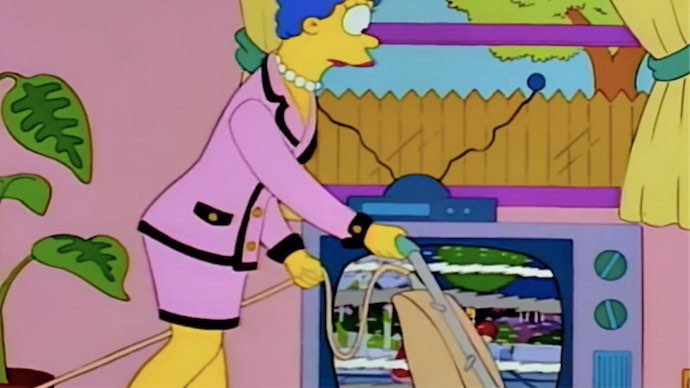Back when The Simpsons first started airing, there were many TV families that espoused the concept of how a modern family should work, usually based on the conservatively religious ideals of the age.
The Simpsons stuck to those same kind of ideals while parodying and even mocking them at times. Now, as we progress into the 21st century, most of those older TV families have disappeared and only Springfield's first family remains from the bunch.
Homer and Marge Simpson may have started their television lives as parents to unruly children, they've evolved over the years—and the couple have impacted our culture's image of a successful marriage.
Many experts and psychologists have looked at the portrayal of Homer and Marge's relationship and (surprisingly) found that it showcases a couple who have a perfect blend of marital chemistry. And it all began way back in the 1980s with the show's first episode.
Here's our look at why Homer and Marge Simpson are the perfect TV couple, why their enduring bond remains the best relationship in TV history, and the effect they have on modern audiences.
1. The Openness of Their Feelings

If there's one area where Homer and Marge excel, it's in how they express themselves to each other: with openness and transparency.
As far as Homer is concerned, he's an open book. His emotions are on the surface to be seen by the world.
We see this on clear display in "And Maggie Makes Three" when Homer carries the burden of supporting his family as he returns to the nuclear power plant, only to break down seconds after walking in the door and confessing his misery to Marge.
Homer isn't capable of keeping his feelings bottled up, and he expresses himself openly to whomever is generally around him.
Marge has a more hardened approach to her emotions, but she still demonstrates openness when she vents. When Marge becomes angry, everybody appears to wither before her.
We see an example of this in "Secrets of a Successful Marriage" after Homer blabs to his class about Marge's personal life.
It causes an enraged Marge to yell at Homer: "Don't you ever tell them personal things about me again!" To which Homer recoils and can only manage a high-pitched, "Yes, ma'am!"
The willingness of each to vent and tell the other how they truly feel is at the core of their marriage, making them a stronger couple for it.
2. Their Tolerance of Each Other's Flaws

This one is less about Homer's tolerance of Marge and more about Marge's tolerance of Homer.
The fact that Marge can put up with Homer's various schemes and less desirable qualities makes her perfect from Homer's perspective. Marge loves Homer far too much to ever leave him for good, and Homer knows that truth on some deeper level.
For all the mistakes he makes, Marge always forgives Homer. At the same time, Homer's love for Marge stops him from doing unforgivable things, such as when he's tempted to cheat on Marge with Mindy Simmons in "The Last Temptation of Homer."
Of course, despite a kiss with Mindy, Homer can't go through with it because Marge is his perfect soulmate. Instead, Homer invites Marge to Capitol City where's he's staying on a work trip.
The temptation of other lovers has happened the other way around, too. Marge became infatuated with Jacques in "Life on the Fast Lane" during her stint as a bowler.
Like Homer with Mindy, she can't bear to lose Homer—and instead of meeting Jacques, she surprises Homer at the power plant (perfectly parodying An Officer and a Gentleman in the process).
The fact that they put up with one another's frequent bad choices showcases the strength of their bond, and that keeps them safe in the knowledge that they're made to be together.
3. Their Acceptance of Each Other

For all that Homer puts Marge through, she always forgives him. More importantly, she understands and accepts that it's part of Homer's being to make brash and moronic decisions.
During "The War of the Simpsons," in which Homer gets horribly drunk at his own party and leers at Maude Flanders, Marge takes Homer on a retreat with Reverend Lovejoy to fix their marriage—and, at one point, she lists all of the things that Homer does wrong.
The list takes so long to get through that everyone else at the marriage retreat ends up exhausted from listening to Homer's flaws.
But, of course, when Homer demonstrates that his capturing of a legendary fish is less important to him than Marge's opinion, she forgives him right then for all the things he does.
There are also parts of Marge that Homer finds annoying. For a large part of the series, Marge proves to be a killjoy in Homer's eyes as he and Bart mostly take their antics to the extreme.
But despite getting on each other's nerves so often, they both understand that they are who they are—and they both accepts one another for who they are as individuals, including flaws and shortcomings.
It goes so far as to each one being willing to sacrifice their own individual goals for the sake of the other if it means choosing one or the other.
One example of this is in the episode "Scenes From the Class Struggle in Springfield" when Marge wants to join a country club. Homer goes to extra lengths to make sure they don't embarrass Marge at any point, even though the rest of the family doesn't want to join.
4. Their Reliance on Each Other

In the end, Marge and Homer trust one another completely, and that allows them to fully rely on each other.
There's seemingly no sense for Marge to put as much faith as she does in Homer, but she frequently trusts him with decisions in their marriage. Marge never worries about Homer's fidelity and she always knows that Homer will provide for his family first.
Homer's trust in Marge stems from him being unable to function without her, as seen in "Secrets From a Successful Marriage." She's the reason he keeps clean, gets up in the morning, and goes to work.
And whenever one is trying to deal with their children, there's always a sense that they need the other for balance.
Homer struggles to understand Lisa without Marge. Marge can't control Bart's antics without the help of Homer (even though Homer sometimes exacerbates those shenanigans). Homer doesn't have the same bond with Maggie that Marge does, as seen in "Homer Alone."
Perhaps their enduring trust in each other doesn't always make sense, but that unwavering confidence in each other is what enables each one to do what's good and right even when it's difficult.





